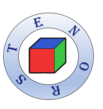TENORS’s recruitment strategy strictly follows the European Charter for Researchers and the Code of Conduct for the Recruitment of Researchers. The recruitment process involves the following 3 stages:
- Application : To apply for a PhD position, use the link on easychair:https://easychair.org/my/conference?conf=tenors2427 to submit the application including a CV, a motivation letter and 2 references. The advisors of TENORS will visit Easychair to evaluate all applications. The host institution will lead the screening of the applications and will invite a selection of candidates for an interview. This selection will be based on the candidates’ motivation, academic credentials and references and ensuring a strict equal-opportunities policy and procedure. The local recruiting committee will keep an overview of the candidates and communicate to other beneficiaries if a candidate is also suitable for other projects within TENORS.
- Interviews: An interview of the selected candidates will be conducted online or on-site or at TENORS’ recruitment event by the main supervisor and at least one co-supervisor. The candidate is invited to prepare a 5-7 minutes presentation of their Master’s Thesis, or a relevant project they worked on in the past. Selection will be made based on the presentation, the previous relevant experience, and the answers given to standardised questions, to ensure equal-opportunities and unbiased selection of candidates.
- Possible Second Interview: A second round of interviews may be needed for the final selection of candidates. Selection will take place in accordance with gender equality and minority rights.
Concept of the TENORS Fellowship
Eligibility
- Doctoral candidate: all researchers recruited in a Doctoral Network must be doctoral candidates, i.e. not already in possession of a doctoral degree at the date of the recruitment.
- Mobility Rule: doctoral candidates must not have resided or carried out their main activity (work, studies, etc.) in the country of the recruiting host organisation for more than 12 months in the 3 years immediately before the recruitment date. Compulsory national service, short stays such as holidays, and time spent as part of a procedure for obtaining refugee status under the Geneva Convention are not taken into account.
Secondments
All doctoral candidates will have inter-sectoral and international experience through secondments, for a duration of 9-12 months at partner organizations in order to obtain the double (or joint) degree and of
2-3 months to an industrial partner or at a network organization. During the secondments doctoral candidates will be supervised and trained by the principal advisors and senior researchers at the institution where the secondment is planned. Also, visiting DCs will participate in all local research events, lab meetings, etc., to gain insight into the local research culture.
Normal practice during secondments is for the doctoral candidates to keep their contract with the sending organization, which also pays the travel and subsistence expenses. During their secondment, doctoral candidates receive supervision and training at the premises of the receiving organization. Secondments are differentiated from short visits, i.e. of a few days. Secondments are mandatory. If you apply for one of the positions then you agree that you will be seconded to other organizations during your contract.
Contract, benefits and salary
Each candidate that is hired will be based at the premises of the host institute where they applied.
The Marie Skłodowska-Curie (MSCA) programme offers competitive and attractive salary and working conditions. The successful candidate will receive a gross salary in accordance with the MSCA regulations for doctoral candidates.
Exact salary will be confirmed upon appointment
Marie Sklodowska-Curie PhDs are paid a competitive gross salary of 3,400€/month, adjusted for their host country, a Mobility Allowance of 600 €/month and, for researchers who have a family, a Family Allowance of 660 €/month. All amounts are subject to deductions and taxes. Family is defined as persons linked to the researcher. Family status is determined at recruitment and does not evolve regardless of whether the family will move with the doctoral candidate or not. In this context, family is defined as persons linked to the doctoral candidate by (i) marriage, or (ii) a relationship with equivalent status to a marriage recognised by the national or relevant regional legislation of the country where this relationship was formalised; or (iii) dependent children who are actually being maintained by the doctoral candidate. Please be aware that these amounts can be subject to taxes.
The contracts include social security coverage providing at least sickness and parental benefits, invalidity and accidents at work and occupational diseases, covering the doctoral candidate in every place of implementation of TENORS activities. As these will be paid by the employer and depend on country-specific regulations, the final net salary that each doctoral candidate will receive may differ.
In addition to the individual scientific projects, all doctoral candidates will benefit from further continuing education including secondments, a variety of training modules as well as transferable skills courses and active participation in workshops and conferences.
Further information
The EURAXESS website may provide useful information (e.g., visa). More information about Marie Skłodowska-Curie actions can be found here. For other questions you can contact us at tenors-contact@inria.fr




